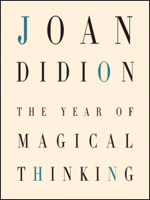| |
2000s |
| |
After Dark, Haruki Murakami
The Amazing Adventures of Kavalier & Clay, Michael Chabon
Asterios Polyp, David Mazzucchelli
Atonement, Ian McEwan
August: Osage County, Tracy Letts
The Book of Revelation, Rupert Thomson
The Corrections, Jonathan Franzen
Chronicles Volume One, Bob Dylan
The Devil in the White City: Murder, Magic and Madness at the Fair That Changed America, Erik Larson
Empire Falls, Richard Russo
A Fraction of the Whole, Steve Toltz
The Gum Thief, Douglas Coupland
A Heartbreaking Work of Staggering Genius, Dave Eggers
The Inheritance of Loss, Kiran Desai
The Inner Circle, T.C. Boyle
The Living, Pascale Kramer
Love in Infant Monkeys, Lydia Millet
The Monsters of Templeton, Lauren Groff
On Chesil Beach, Ian McEwan
Prodigal Summer, Barbara Kingsolver
The Secret Scripture, Sebastian Barry
The Story of Edgar Sawtelle, David Wroblewski
The Tender Bar, J.R. Moehringer
The Year of Magical Thinking, Joan Didion
Then We Came to the End, Joshua Ferris
Veronica, Mary Gaitskill
Zeitoun, Dave Eggers |
|
|
The Year of Magical Thinking, Joan Didion
Alfred A. Knopf, October 4, 2005
Death seizes a unique hold with grips as assorted as the misshapen cancerous tumors attacking in its commission, the final tally of heartbeats constituting a lifetime, or the last thought metastasizing from the decedent’s insular consciousness onto the vulnerable faith of the grieving. Bereavement is an expression adverse to replication. Still, the human desire to decode mystery compels us to find familiarity even in our deepest anguish.
This is my attempt to make sense of the period that followed, weeks and then months that cut loose any fixed idea I had ever had about death, about illness, about probability and luck, about good fortune and bad, about marriage and children and memory, about grief, about the ways in which people do and do not deal with the fact that life ends, about the shallowness of sanity, about life itself.
The most acute secondhand exploration of feelings suppressed and released throughout mourning cannot appease those adrift in sadness, though. Nuances of circumstance interlaced with the emotions following the passing of a loved one are much too personal to conform to an arbiter’s guide. Trails of tears lead to private destinations, and roadmaps are useless, especially when the journey’s end changes position faster than the surface of the sea.
Grief turns out to be a place none of us know until we reach it. We anticipate (we know) that someone close to us could die, but we do not look beyond the few days or weeks that immediate follow such an imagined death. We misconstrue the nature of even those few days or weeks. We might expect if the death is sudden to feel shock. We do not expect this shock to be obliterative, dislocating to both body and mind.
Only once we accept that the reality of coping with loss aligns with an indistinguishable world can we open ourselves to catharsis. The individual who turns to a book on the subject of grief, therefore, and concludes it is an example of the way one will react during a situation of extreme crisis becomes an apprentice to the magician’s sleight of hand. Processes, steps and clinical analysis contribute to prevailing grand illusions. The fact is the deceased disappear from our physical world, and survivors are left to react.
Just an ordinary day.
“And then—gone.”
We are on our own the moment tragedy strikes. Another’s testimony may bring our afflictions a sense of clarity, and therein rests the power of contemplative writing on the subject. Cribbing the observations of others and using them for comparison to typify a precipitating life event, however, restricts feelings from taking malleable shape, going where they will, without a charted course, to depths for which preparation and review is immaterial.
Life changes fast.
Life changes in the instant.
You sit down to dinner and life as you know it ends.
The future is so very indeterminate. Take my word for it.
-MEG

|
|
 |

